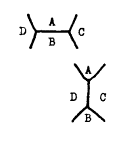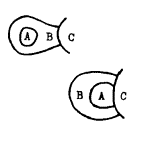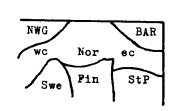Difference between revisions of "Seismic"
Former.trout (talk | contribs) (New page: by Pierre Lavaurs First published in French by Jean-Phillippe Hubsch in Vortigern 60. Translated by John Marsden and published in English in Ode 21. === Variant Rules And Description: =...) |
Former.trout (talk | contribs) |
||
| Line 14: | Line 14: | ||
4. There are two kinds of Seismic Event, as follows: | 4. There are two kinds of Seismic Event, as follows: | ||
| + | [[Image:seismi3.gif|thumb|200px]] | ||
| − | |||
(a) Seperation and Connection: | (a) Seperation and Connection: | ||
| Line 26: | Line 26: | ||
Note that 'C' and 'D' may be the same area. For example: Por & Spa separate, MAO & MAO connect, leaves Portugal an island in the MAO. It can occur that an order of this kind is ambiguous; such orders will be disallowed unless the player makes his intentions clear. | Note that 'C' and 'D' may be the same area. For example: Por & Spa separate, MAO & MAO connect, leaves Portugal an island in the MAO. It can occur that an order of this kind is ambiguous; such orders will be disallowed unless the player makes his intentions clear. | ||
| + | |||
[[Image:seismi4.gif|thumb|200px]] | [[Image:seismi4.gif|thumb|200px]] | ||
| + | |||
(b) Release | (b) Release | ||
| Line 42: | Line 44: | ||
Portugal thus becomes a peninsula attached to the south corner of Brest. | Portugal thus becomes a peninsula attached to the south corner of Brest. | ||
| + | |||
[[Image:seismi5.gif|thumb|200px]] | [[Image:seismi5.gif|thumb|200px]] | ||
| + | |||
5. Switzerland and the Outside of the board, which are considered as impassable provinces, can be included in Seismic Orders. | 5. Switzerland and the Outside of the board, which are considered as impassable provinces, can be included in Seismic Orders. | ||
| Line 100: | Line 104: | ||
| − | ''“I’ve spent a bit of time thinking about possible seismic orders and tactics, and I will try to give a resume of the ideas I’ve had so far. | + | ''“I’ve spent a bit of time thinking about possible seismic orders and tactics, and I will try to give a resume of the ideas I’ve had so far. '' |
| − | The Seismic orders can be used to move units around the board faster, for example, after Italy has convoyed to Tunis, on the same move as he moves to NAf he can order MAO & WMS separate, Naf and Spa connect. This gives Italy the opportunity to bring an army up through France’s backside more easily, particularly if backed up by an army in Pie. Alternatively, Italy could attack Turkey fast, ordering AEG and Gre separate, Bul and Ion connect, or Austria can be attacked more easily by Ads and ION separate, Apu and Alb connect. Similar possibilities exist for the other countries. The result of this kind of attacking order will be to promote unusual alliances, in that, say, Turkey can have a profound effect on the France-England front, if he wants to, perhaps in exchange for favours against a common enemy at a later date. | + | ''The Seismic orders can be used to move units around the board faster, for example, after Italy has convoyed to Tunis, on the same move as he moves to NAf he can order MAO & WMS separate, Naf and Spa connect. This gives Italy the opportunity to bring an army up through France’s backside more easily, particularly if backed up by an army in Pie. Alternatively, Italy could attack Turkey fast, ordering AEG and Gre separate, Bul and Ion connect, or Austria can be attacked more easily by Ads and ION separate, Apu and Alb connect. Similar possibilities exist for the other countries. The result of this kind of attacking order will be to promote unusual alliances, in that, say, Turkey can have a profound effect on the France-England front, if he wants to, perhaps in exchange for favours against a common enemy at a later date.'' |
| − | There are plenty of good defensive possibilities available, which should give trailing countries chances to survive long enough to regroup. To take the example of the frequent conflict between France and England, an England in trouble has the opportunity to make a French invasion difficult, whether he has units in position or not. Orders such as Lon and ENG separate, Wal and NTH connect should make London more secure, particularly against a French F(ENG).”'' | + | ''There are plenty of good defensive possibilities available, which should give trailing countries chances to survive long enough to regroup. To take the example of the frequent conflict between France and England, an England in trouble has the opportunity to make a French invasion difficult, whether he has units in position or not. Orders such as Lon and ENG separate, Wal and NTH connect should make London more secure, particularly against a French F(ENG).”'' |
- Comments by Mike Woodhouse in Blackmail No. 4 (June 1981) | - Comments by Mike Woodhouse in Blackmail No. 4 (June 1981) | ||
Revision as of 18:02, 7 January 2008
by Pierre Lavaurs First published in French by Jean-Phillippe Hubsch in Vortigern 60. Translated by John Marsden and published in English in Ode 21.
Variant Rules And Description:
1. The 1971 Diplomacy Rulebook applies, except where amended below.
2. After Spring retreats, and after Winter adjustment~, an additional phase takes place: Seismic Events
3. Each player may order one Seismic Event each season.
4. There are two kinds of Seismic Event, as follows:
(a) Seperation and Connection:
This involves four provinces (land or sea) forming this kind of configuration:
The order is: A and B separate, C and D connect.
If the order is applicable, the configuration becomes:
Note that 'C' and 'D' may be the same area. For example: Por & Spa separate, MAO & MAO connect, leaves Portugal an island in the MAO. It can occur that an order of this kind is ambiguous; such orders will be disallowed unless the player makes his intentions clear.
(b) Release
If three provinces form this configuration a release order would be A and C connect.
If the order is applicable, the configuration becomes:
Example:
. England, Spring 1901: Por & Spa separate, MAO & MAO connect. . France, Autumn 1901: Por & Bre connect.
Portugal thus becomes a peninsula attached to the south corner of Brest.
5. Switzerland and the Outside of the board, which are considered as impassable provinces, can be included in Seismic Orders.
Example:
- England, Spring 1901: StP & BAR separate, Nwy & Out connect.
- Russia, Spring 1901: NWG & BAR separate, Nwy & Out connect.
- England, Autumn 1901: Nwy & BAR separate, Out & Out connect.
The Barents Sea thus becomes trapped in the outside and inaccessible.
- Italy, Spring 1902: BAR & Tun connect.
BAR now becomes a lake attached to the south of Tun
6. If two or more players make the same Seismic order, this has the effect of support - conflicting orders succeed if thus supported.
7. Seismic orders are inadmissible in the following cases:
(a) If there is another Seismic order, equal or greater, which, if applied with the offending order, would have the effect of dividing a province into parts.
(b) If there is an equal or greater Seismic order which, if applied after the offending one, would not make sense.
example cases:
case #1
- Austria: Bul & Gre separate; Ser & AEG connect.
- Turkey: Bul & AEG separate; Gre & Con connect.
case #2
- Austria & Russia: Bul & Gre Separate; Ser & AEG connect.
- Turkey: Bul & AEG separate, Gre & Con connect.
In the first case, the effect would be to split AEG into two; in the second case Austria's order succeeds because it is duplicated by Russia and Turkey's then fails because separating Bul & AEG would not permit Gre & Con to connect.
case #3 spring orders:
- England: For & Spa separate; MAO & MAO connect
autumn orders:
- England: For & Ire connect.
- France: Por & Bre connect
The successive application of these orders would have the effect of dividing MAO in two.
8. The application of a Seismic order can cause a coastal province to be divided into two or more coasts when it previously had one or none, or to divide a previous coast into more than one. In this case, players must give provisional orders as to where a fleet in such a province should be placed. In the absence of such orders the GM will determine this randomly, or according to a convention agreed at the start of the game.
If, following Seismic orders, the coast on which a fleet is located disappears, and that province possessed other coast(s), the fleet is automatically relocated - conditional orders being accepted if there were three or more coasts. Should a fleet be left in a province without coasts, it is trapped and may only stand until a coast is opened for it. It may be supported in standing.
9. Certain provinces are regarded as 'straits provinces'. If they possess coasts on both of the following sea areas, those coasts are regarded as one: Con with BLA & AEG; Kie with HEL & BAL; Den with SKA & BAL; Swe with SKA & BAL; Nap with ION & TYS
Comments And Gameplay Observations:
“I’ve spent a bit of time thinking about possible seismic orders and tactics, and I will try to give a resume of the ideas I’ve had so far.
The Seismic orders can be used to move units around the board faster, for example, after Italy has convoyed to Tunis, on the same move as he moves to NAf he can order MAO & WMS separate, Naf and Spa connect. This gives Italy the opportunity to bring an army up through France’s backside more easily, particularly if backed up by an army in Pie. Alternatively, Italy could attack Turkey fast, ordering AEG and Gre separate, Bul and Ion connect, or Austria can be attacked more easily by Ads and ION separate, Apu and Alb connect. Similar possibilities exist for the other countries. The result of this kind of attacking order will be to promote unusual alliances, in that, say, Turkey can have a profound effect on the France-England front, if he wants to, perhaps in exchange for favours against a common enemy at a later date.
There are plenty of good defensive possibilities available, which should give trailing countries chances to survive long enough to regroup. To take the example of the frequent conflict between France and England, an England in trouble has the opportunity to make a French invasion difficult, whether he has units in position or not. Orders such as Lon and ENG separate, Wal and NTH connect should make London more secure, particularly against a French F(ENG).” - Comments by Mike Woodhouse in Blackmail No. 4 (June 1981)


